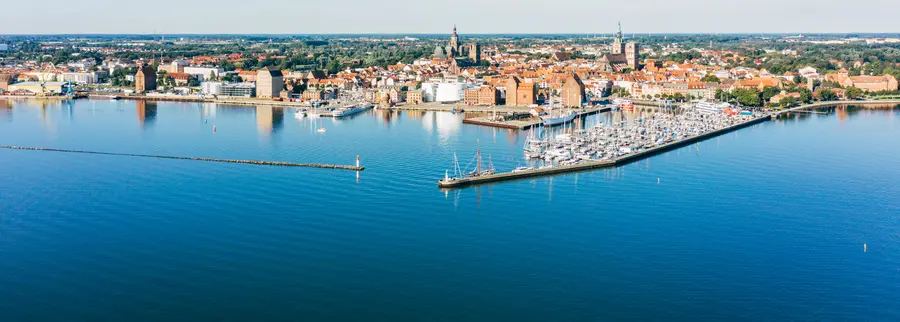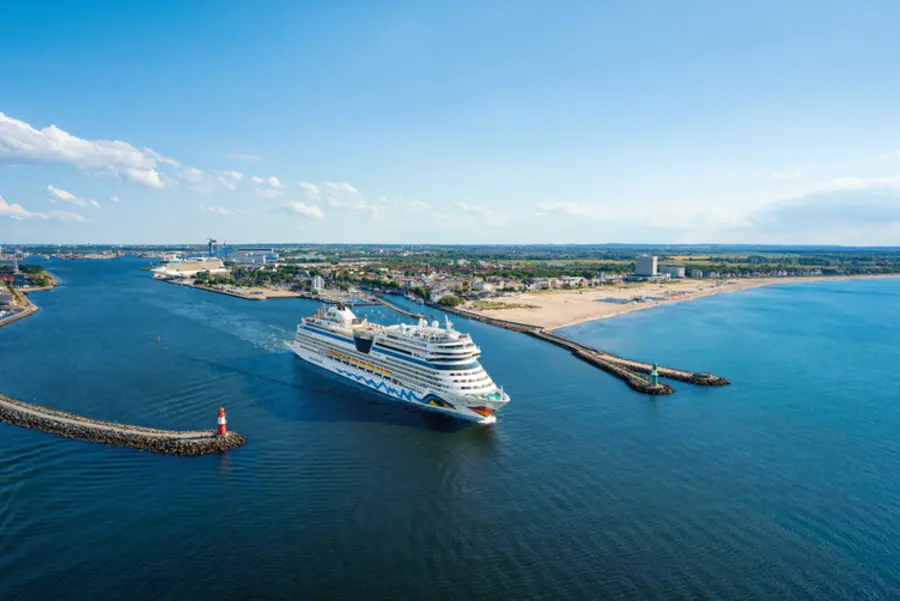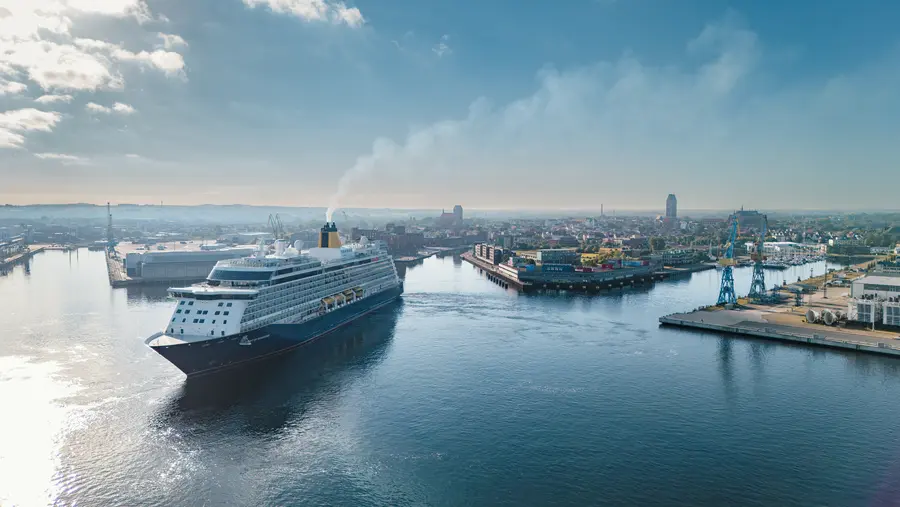cruise destination Mecklenburg-Vorpommern
Where water and land merge seamlesly
Mecklenburg-Vorpommern is a unique cruise destination that delights its visitors with a fascinating combination of maritime diversity and impressive land attractions. The region combines the best of both worlds: idyllic waterways, a spectacular Baltic coastline and charming harbour towns meet historical sights, unspoilt nature and a multitude of cultural experiences on land.
River cruise in Mecklenburg-Vorpommern
The picturesque rivers and canals of Mecklenburg-Vorpommern offer perfect conditions for river cruises. The Hanseatic city of Stralsund is the central harbour for river cruises in Mecklenburg-Vorpommern. In 2025, 127 river cruise ships will call at Stralsund. Along the coast of Western Pomerania, from Hiddensee across the Bodden to the banks of the Peene, the region delights with breathtaking nature and cultural highlights.
Ocean cruise: maritime tourism along the Baltic Sea coast
The Baltic coast of Mecklenburg-Vorpommern is an important hub for ocean cruises. The ports of the Hanseatic city of Rostock and the Hanseatic city of Wismar are not only popular ports of call for international cruise ships, but also important hubs for the maritime tourism industry. Cruise guests can explore the sights of Mecklenburg-Vorpommern from here. Cruise highlights in 2025 include the first calls in Wismar and Rostock. The Star Pride from Windstar Cruises will dock in the Hanseatic city of Wismar for the first time on 1 June 2025, as will the MS Hamburg from Plantours on 6 June 2025. This year, these seven cruise ships will call at the cruise port of Warnemünde in the Hanseatic city of Rostock for the first time:
- Viking Vela from Viking Ocean Cruises on 12 May 2025,
- SeaDream 2 from SeaDream Yacht Clus on 03 June 2025,
- Carnival Miracle from Carnvial Cruise Line on 12 June 2025,
- Vista from Oceania Cruises on 03 July 2025,
- Viking Saturn from Viking Ocean Cruises on 08 July 2025,
- Ilma from Ritz-Carlton Yacht Collection on 04 August 2025 and
- Le Laperouse from Compagnie du Pondant on 12 August 2025.
Sustainable cruises from Mecklenburg-Vorpommern: Investing for a green future
With major players in the German cruise industry, such as A-ROSA and AIDA Cruises, both based in Rostock, the combination of innovation, environmental awareness and comfort is being consistently developed for cruise shipping. MV Cruise Net partners TUI Cruises and MSC Cruises are also aware of their responsibility and are driving the change towards sustainability. Cruise shipping serves as a pioneer for the entire shipping industry.
A-ROSA: Sustainability on the rivers
A-ROSA is driving change in river cruising. The use of Marine Gas Oil (MGO), a virtually sulphur-free fuel without heavy fuel oil, ensures cleaner air and significantly less pollution. Energy-optimised route planning, longer stays in cities and shorter journeys make travelling efficient and environmentally friendly. Disposable plastic is almost a thing of the past: Waste is separated, waste water is purified by modern sewage treatment plants and the waste heat from the engines is used sensibly for hot water. The A-ROSA SENA is a real highlight: the e-motion ship can temporarily travel purely electrically so as not to cause any emissions in cities. Together with the Fraunhofer ISI, A-ROSA is working on shaping a sustainable future - with clear strategies and a close look at its own climate footprint. Find out more: www.a-rosa.de/unternehmen/nachhaltigkeit.html
AIDA Cruises: Green Cruising on the baltic sea
With its green cruising strategy, AIDA Cruises is putting sustainability on track and pursuing the goal of sailing climate-neutrally by 2050. The AIDAnova and AIDAcosma are setting standards with LNG technology: liquefied natural gas significantly reduces emissions of particulate matter, sulphur oxides and CO2 and bridges the gap until climate-neutral fuels are available. Innovations take centre stage: AIDA is testing biofuels, researching the use of wind energy and working on hybrid technologies and the use of biological waste as fuel. Sustainability is also evident in every detail on board - from fresh water extraction and recycling to intelligent food management. Find out more: www.aida.de/unternehmen/nachhaltigkeit.
TUI Cruises: sustainability with strategy
TUI Cruises is passionate about innovation and sustainability for environmentally friendly cruises. From 2024, new ships will be powered by low-emission LNG, while Mein Schiff 7 is already equipped for green methanol and currently runs on marine diesel. TUI Cruises is taking a pioneering role with science-based targets: Its vision is to offer the first climate-neutral cruises by 2030 and to achieve climate-neutral (net-zero) cruise operations by 2050 at the latest. Environmental protection is also practised on board - waste water is treated in the ship's own treatment plants and a consistent recycling system minimises waste. More about this: meinschiff.com/nachhaltigkeit.
Sustainability at MSC Cruises: a promise for the future
MSC Cruises is committed to reducing emissions, protecting the oceans and utilising resources efficiently. Together with technology companies, shipyards and fuel suppliers, innovative solutions are being developed to achieve a climate-neutral fleet by 2050. At the same time, MSC endeavours to promote positive social and economic impacts in the communities it serves. Together with local authorities and tour operators, new ways are being found to reduce the impact on urban infrastructure. Read more: msc.de/nachhaltigkeit.
Shore power: the key to a clean cruise
In Rostock-Warnemünde and, since 2024, also in the river cruise port of Stralsund, modern shore power systems supply cruise ships with zero emissions while they are docked. The electricity, which is mainly generated from renewable sources such as wind power, significantly reduces the environmental impact. There are already around 35 of these systems worldwide, which sustainably reduce the CO2 footprint of the cruise industry - a significant step towards cleaner air and the protection of our coasts.


